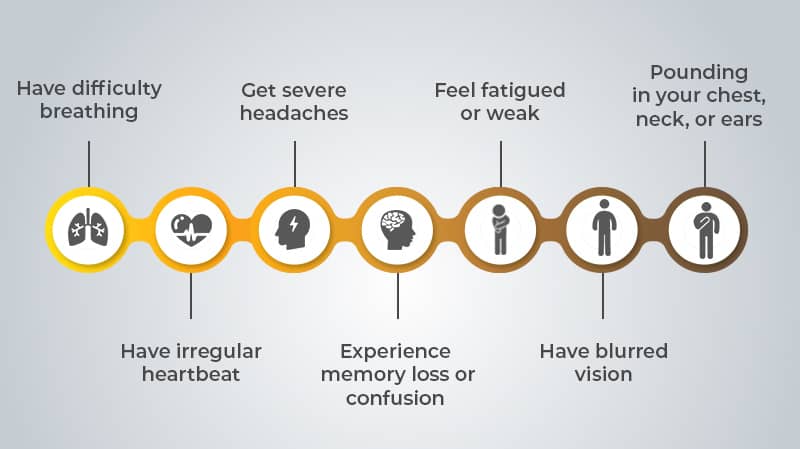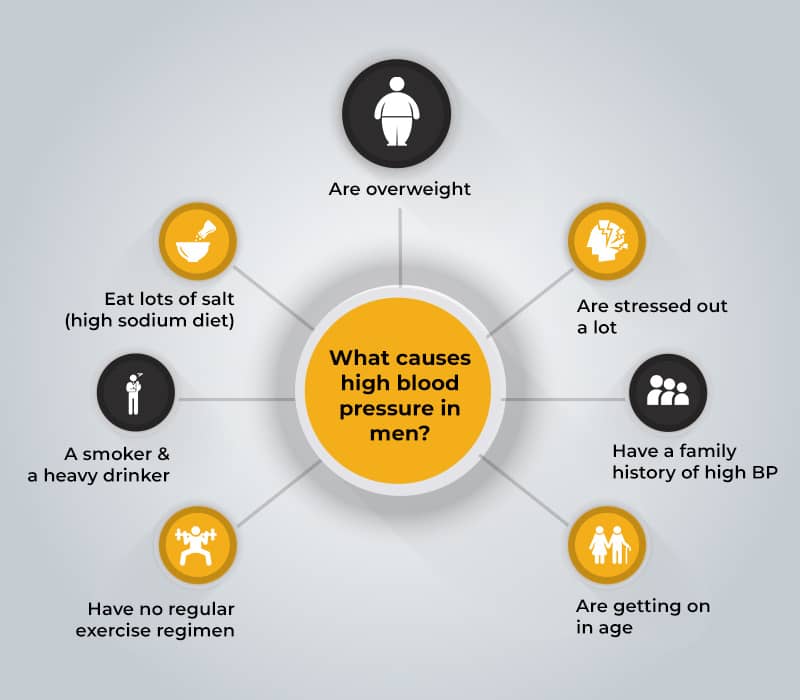High Blood Pressure Symptoms in Men

Table of Contents
Hypertension or high blood pressure is one of the most prevalent health conditions today with estimates stating that almost one-third of India’s population will suffer from it by the year 2020. The recent health data shows that every one in four adults has high BP with around 20 crore Indians already suffering from it with 10 million added to that list every year. The incidence of hypertension is 20 to 40% in urban areas and 12 to 17% in rural areas of India. Approximately, 23.10% men and 22.60% women above 25 years of age have high blood pressure.
This condition is dangerous as high blood pressure symptoms are not evident, in fact, most people who suffer from it are not even aware that they have high BP. But the repercussion of uncontrolled or untreated high blood pressure are serious and can cause severe damage to the body’s vital organs such as arteries, heart, brain, and kidneys among others.
Hypertension Symptoms In Men
-
Have difficulty breathing.
-
Have irregular heartbeat.
-
Get severe headaches.
-
Experience memory loss or confusion.
-
Feel fatigued or weak.
-
Have blurred vision.
-
Pounding in your chest, neck, or ears.
As mentioned above high BP does not show visible symptoms and is therefore often referred to as the silent killer. But there might be some early signs of hypertension that men (and women) need to pay close attention.
If you are consistently suffering from the above then you may have high blood pressure and need to consult your doctor.
High Blood Pressure Concerns For Men
Earlier it was thought that only elderly men were affected by high blood pressure. But recent medical data shows high blood pressure symptoms in men are also common in younger men, (35 and less) and should be taken just as seriously as in their older counterparts.
High blood pressure or hypertension kills nearly 1.5 million people every year in South-East Asia as hypertension affects the major organs & functions of the human body such as:
-
Narrowed Arteries –
High BP can damage the inner lining of the arteries making them less elastic limiting blood flow. Hypertension can weaken the artery walls causing a section of a wall to enlarge and form a bulge or aneurysm which, if ruptured, can cause internal bleeding that can be fatal.
-
Heart Damage –
Uncontrolled high blood pressure narrows arteries which supply blood to the heart muscles. Narrow arteries mean that the free flow of blood to the heart is impeded and can cause chest pain, irregular heartbeats (arrhythmias) or even a heart attack. High BP means that the heart has to work much harder to pump blood and can cause the left ventricle to stiffen. This affects its ability to pump blood to the body increasing the risk of heart failure and sudden cardiac death.
-
Brain Damage –
As with the heart, the brain needs smooth blood flow to function properly. High blood pressure disrupts this easy blood flow and can lead to a blood clot or transient ischemic attack, a warning that a full-blown stroke may happen. Uncontrolled high blood pressure can cause blood clots in the arteries that go to the brain and may lead to stroke (by damaging and weakening the brain’s blood vessels, causing them to narrow, rupture or leak).In addition to a stroke, high blood pressure can also cause vascular dementia (difficulty with thinking, speaking, reasoning, memory, vision, and movement) or mild cognitive impairment due to an interruption of blood flow to the brain.
-
Kidney Problems –
The kidneys are the waste disposal system in the human body throwing out excess fluids and waste matter. The kidneys depend on healthy blood vessels for performing the task and high blood pressure can injure both the blood vessels in and leading to the kidneys, causing several types of kidney diseases such as kidney failure, kidney artery aneurysm or kidney scarring.
-
Vision Damage –
High blood pressure can damage the vessels supplying blood to the retina resulting in blurred vision or in extreme cases loss of vision. Hypertension can also cause optic nerve damage (optic neuropathy) which causes bleeding within the eyes or even vision loss.
-
Sexual Dysfunction –
As men age (after 50 years), the inability to maintain an erection is common but men who suffer from high blood pressure may face erectile dysfunction more frequently as high BP limits blood flow to the pelvic area (high BP damages the lining of the blood vessels and causes the arteries to harden and narrow thus impeding smooth blood flow) making it difficult to achieve and maintain erections.
As high BP has no obvious symptoms, the only way to maintain blood pressure levels is to get the BP checked and monitored regularly from the doctor. In addition to that adopting healthy lifestyle choices such as quitting smoking & alcohol, including a healthy high fiber, low sodium diet foods, having a regular exercise regimen, getting enough sleep, keeping stress levels to a minimum can keep the blood pressure levels in the normal and healthy range.
What causes high blood pressure in men?
-
Overweight
-
Stressed out a lot.
-
Having a family history of high BP.
-
Getting on in age.
-
Have no regular exercise regimen.
-
A smoker & a heavy drinker.
-
Eat lots of salt(high sodium diet).
Note of caution: This article is for information purpose only. Always consult your doctor in case of any blood pressure or other health-related problems.
FAQs
1. How do you feel when you have high blood pressure?
Most people do not feel the symptoms of high blood pressure for years. If you feel shortness in breadth, prolonged headaches, heaviness or chest pains, pain or tingling sensations in the left hand, these are the common high BP symptoms. The best advice would be to consult a physician.
2. What is considered high blood pressure for a man?
Men tend to have higher blood pressure levels than women. So any blood pressure reading that is higher than 120/80 mm Hg is considered as high blood pressure.
3. How do you know if your blood pressure is high or low?
The normal blood pressure reading is 120/80 mm Hg. If the reading is higher than normal, then it is high blood pressure. Similarly, if the reading is lower than normal, then it is called low blood pressure.
4. What is the normal BP level for male?
The normal BP level in an adult would be 120/80 mm Hg. If the readings are higher than this, it is considered hypertension. Men usually have higher BP levels than women, making them prone to hypertension. You could easily identify if someone has high BP by noticing these high blood pressure symptoms in men: Severe or prolonged headaches, chest pains or heaviness, nosebleeds, sudden fatigue and restlessness.
Disclaimer
The information contained in this article is to educate, spread awareness in relation to hypertension and other diseases to the public at large. The contents of this article are created and developed by BPinControl.in through its authors, which has necessary, authorisations, license, approvals, permits etc to allow usage of this articles on The Website. The views and opinions expressed in this article are views, opinions of the respective authors and are independently endorsed by doctors. Although great care has been taken in compiling and checking the information in this article, The Website shall not be responsible, or in any way liable for any errors, omissions or inaccuracies in this article whether arising from negligence or otherwise, or for any consequences arising therefrom. The content of this article is not a substitute for any medical advice. The Website shall not be held responsible or liable for any consequence arising out of reliance on the information provided in the article.




Comments (2)
Santoshi
Good to know information.
Aayushi
Great, thanks
Add your comment